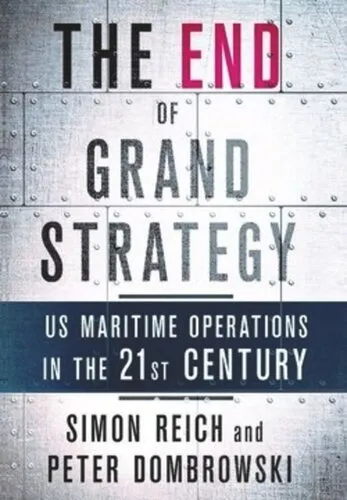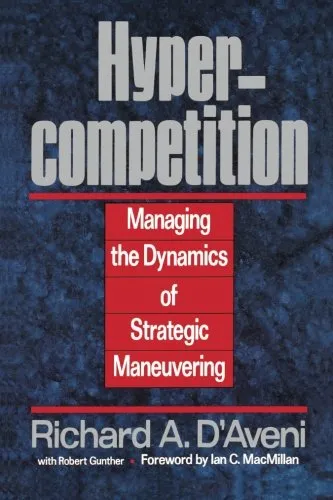The End of Grand Strategy: US Maritime Operations in the Twenty-First Century
4.5
بر اساس نظر کاربران

شما میتونید سوالاتتون در باره کتاب رو از هوش مصنوعیش بعد از ورود بپرسید
هر دانلود یا پرسش از هوش مصنوعی 2 امتیاز لازم دارد، برای بدست آوردن امتیاز رایگان، به صفحه ی راهنمای امتیازات سر بزنید و یک سری کار ارزشمند انجام بدینکتاب های مرتبط:
معرفی کتاب 'The End of Grand Strategy: US Maritime Operations in the Twenty-First Century'
این کتاب به بررسی تغییرات استراتژی دریایی ایالات متحده در قرن بیست و یکم میپردازد و دلایل پایان یافتن استراتژیهای بزرگ را تحلیل میکند.
خلاصه کتاب
در کتاب 'The End of Grand Strategy: US Maritime Operations in the Twenty-First Century' نویسندگان نشان میدهند که چگونه تحولات جهانی و منطقهای شرایطی را به وجود آوردهاند که استراتژیهای یکپارچه و یکنواخت دیگر پاسخگوی نیازهای عملیاتی ایالات متحده نیستند. این کتاب تاکید دارد که نیروهای دریایی با محیطی پیچیده و تغییرپذیر روبرو هستند که نیاز به برخوردهای انعطافپذیرتر و تاکتیکیتر دارد.
این اثر با بررسی مواردی مانند تغییر در الگوهای قدرت جهانی، ظهور چین به عنوان یک قدرت دریایی، و چالشهای پیوستهای که از سوی گروههای تروریستی و بازیگران غیردولتی مطرح میشوند، به این نتیجه میرسد که استراتژیهای یکنواخت تقویل به رویکردهای چندلایه و موزونتر دارند.
نکات کلیدی
- تغییر در اولویتهای نظامی ایالات متحده و تمرکز بر انعطافپذیری عملیاتی.
- ضرورت رویکردهای جزئیتر و منطقهای به جای استراتژیهای جهانی و کلان.
- درک بهتر از تاثیرات بینالمللی تکنولوژیهای نوظهور بر عملیات دریایی.
نقلقولهای مشهور از کتاب
در دنیایی که تمامی متغیرها به سرعت تغییر میکنند، استراتژیهای ایستا و یکپارچه راه به جایی نمیبرند.
نیروهای دریایی نیازمند انعطافپذیری عملیاتی و توانایی واکنش سریع به تغییرات محیطی هستند.
چرا این کتاب مهم است
این کتاب به دلیل رویکرد نوآورانهاش در تحلیل استراتژیهای نظامی و تمرکز بر ضرورت انطباق با شرایط دگرگونی، برای تحلیلگران نظامی، سیاستگذاران و نظریهپردازان روابط بینالملل اهمیت ویژهای دارد. بهکارگیری مثالهای عملی از عملیات دریایی ایالات متحده و تحلیلهای جامع از تغییر و تحولات جهانی، این اثر را به منبع ارزندهای برای درک بهتر از دنیای پیچیده امروزی تبدیل کرده است.
همچنین، این کتاب با به چالش کشیدن مفاهیم سنتی استراتژی و پیشنهاد رویکردهای جایگزین که هماهنگی بیشتری با محیط عملیاتی کنونی دارند، به مباحث استراتژیک معاصر توازن و تنوع میبخشد.
Introduction to 'The End of Grand Strategy: US Maritime Operations in the Twenty-First Century'
'The End of Grand Strategy: US Maritime Operations in the Twenty-First Century' by Simon Reich and Peter Dombrowski is a groundbreaking analysis that challenges conventional wisdom on American naval strategy. By delving deeply into the nuances of maritime operations, this book argues that the era of all-encompassing, one-size-fits-all grand strategies in naval warfare is over. Instead, it presents a new framework for understanding how regional and mission-specific strategies are shaping the contemporary landscape of US maritime operations. This introduction provides a detailed overview of the book, outlines key takeaways, shares some memorable quotes, and explains why this book is an essential read for anyone interested in naval strategy and international security.
Detailed Summary of the Book
At its core, the book challenges the traditional notion of a grand strategy that has long dominated American maritime thought. Throughout the 20th century, grand strategies served as the bedrock for military planning, aiming to unify political, economic, and military objectives under one comprehensive framework. By examining recent U.S. maritime operations, Reich and Dombrowski reveal that these overarching strategies are becoming increasingly obsolete in the 21st-century geopolitical landscape.
They dissect various case studies of U.S. maritime operations across different regions, from the Middle East to the Asia-Pacific, demonstrating how specific geopolitical circumstances necessitate distinct approaches. The authors argue that national security challenges are too complex and varied to be adequately addressed by a monolithic strategy. Instead, they advocate for more flexible, adaptable strategies that are tailored to the unique political, economic, and military circumstances of each region.
Key Takeaways
- The concept of a singular grand strategy is outdated and insufficient for addressing modern security challenges.
- The U.S. must adopt flexible, region-specific strategies that consider the particularities of each operational environment.
- Policy-makers and military strategists need to move towards a more dynamic approach, responsive to diverse global threats and opportunities.
- Strategic adaptability and understanding of local contexts are crucial for effective maritime operations.
Famous Quotes from the Book
"In a world where threats are as diverse as they are unpredictable, the rigidity of a grand strategy is not just a constraint—it is a liability."
"Regional differentiation, rather than universal application, should be the cornerstone of US maritime operations in the 21st century."
Why This Book Matters
The insights offered in 'The End of Grand Strategy' are particularly vital in an era where global political dynamics are in constant flux. The traditional frameworks of military strategy are increasingly challenged by the complexities of a multipolar world, cyber threats, and non-state actors. Reich and Dombrowski's arguments push for a reevaluation of strategic practices that can better accommodate these changes.
This book is pivotal for military scholars, policy-makers, and defense strategists who are grappling with how to effectively deploy naval power in today's rapidly changing global environment. By emphasizing the importance of adaptability and region-specific strategies, it not only challenges existing doctrines but also offers pragmatic solutions that can be employed in future operations.
Ultimately, 'The End of Grand Strategy' represents a shift from the conventional toward innovative approaches in maritime strategy, making it a critical read for those who wish to understand and influence the future of naval operations.
دانلود رایگان مستقیم
شما میتونید سوالاتتون در باره کتاب رو از هوش مصنوعیش بعد از ورود بپرسید
دسترسی به کتابها از طریق پلتفرمهای قانونی و کتابخانههای عمومی نه تنها از حقوق نویسندگان و ناشران حمایت میکند، بلکه به پایداری فرهنگ کتابخوانی نیز کمک میرساند. پیش از دانلود، لحظهای به بررسی این گزینهها فکر کنید.
این کتاب رو در پلتفرم های دیگه ببینید
WorldCat به شما کمک میکنه تا کتاب ها رو در کتابخانه های سراسر دنیا پیدا کنید
امتیازها، نظرات تخصصی و صحبت ها درباره کتاب را در Goodreads ببینید
کتابهای کمیاب یا دست دوم را در AbeBooks پیدا کنید و بخرید
1425
بازدید4.5
امتیاز0
نظر98%
رضایتنظرات:
4.5
بر اساس 0 نظر کاربران
Questions & Answers
Ask questions about this book or help others by answering
No questions yet. Be the first to ask!














